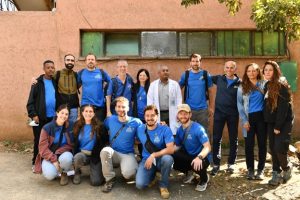
Ecosystem is a gift from nature which encompasses various aspects of creatures that sustain the life of human beings and animals including organisms.
Water bodies, forests, air, swampy areas, mountains, agriculture mines etc can be categorized as renewable and none renewable resources.
Populous countries
such as Ethiopia should manage their natural resources properly because any
damage could bring dire consequence not only on the current generation but also
on the coming ones, says Abdeta Debela, the Ecosystem affairs integrated
development project working under the auspicious of the Commission of
Environment Forest and Climate Change.
Therefore, to protect and properly manage the resources, the communities which devote their time in protecting the resource should not be brushed aside in sharing the benefits generated from the resource.
However, currently, due to various reasons, they are seen neglected and marginalized. Such a situation might force some members of the community to show reluctance in protecting the ecosystem and to the worst scenario collaborate with illegal timber traders. Consequently, such a trend critically endangers the system’s furtherance.
The clearance of forests and vegetation cover in addition to aggravating the current global warming and climate change could pose desertification and dried up water resources.
Forests help withstand soil erosion and facilitates the percolation of water. So that replenishes underground waters and balances the ecosystem at large.
Currently, the flourishing of none-farming economic activities such as manufacturing and service provisions are ceding place to the development of urban centers with a new way of life.
These in turn accelerates the high demand for water for various purposes including household consumptions. It is also understood that failing to meet the demand forces residents to face acute difficulties.
Balanced ecosystem serves as a water reservoir. Hence to utilize water sustainably introducing a voluntary and fair price system without overriding the consumers’ rights for the ecosystem service should be taken as viable means.
In such a way it is possible to generate revenue, which supports conservation activities.
Moreover, the system with new way of social dimension, ecosystem service payment emphasize societal participation, social justice and urge intensive social dialogue, equitable resource distribution and ensure property rights.
In this regard, people that resided on the upper stream could allow the thriving of forests which serves as underground water reservoirs and containing erosion. This in return enables the lower stream communities to get sufficient water vital to develop irrigation farming.
It should be understood that activities which disregard the dependence of the lower stream on the upper one will bring collateral damage on both sides. Getting water either for irrigation or for household purpose also will be unrealistic .They could equally suffer from the consequences, which makes their living condition deplorable.
Hence, to optimize the benefit of the resources sustainably based on the agreement people, in the lower stream, should pay the ecosystem service voluntarily to the upper stream communities. In such a manner the community in the upper stream diligently conserves the ecosystem for mutual benefits.
As to Abdeta, the plan is prepared to ratify proclamation helpful to implement the service payment at national level which could be channeled to the government coffer. Currently, only a water tariff is introduced. The nation did not come across with water charge.
Considering the vitality of ecosystem service charge, the Ministry of Water, Irrigation and Electric, in collaboration of Addis Ababa University and the Awash basin water shade management authority, has reached the final stage in preparing the modality to collect the fee from the customers.
The approach underlines the availability of the resources in each areas and the level of the benefit to be derived out of it.
The fee can be collected together with the electric service charge.
The customers should recognize that electric energy generated from water dams comes from rivers and other water bodies in which the ecosystem plays crucial role for its availability.
It is also understood that plants which are in puts for the production of drugs originates from forests and the natural organisms.
Hence, industries, which produce drugs, should recognize that the sustainability of such inputs depends on the protection of natural resources. Therefore, they should know their duty to pay for the service which is derived out of it.
The fee system should also include industries which consume more water and when they get investment licensee registering them for service fee is possible.
The Investment Commission and the Ministry of Environment, Forest and Climate Change are the major stakeholders in these regard. Particularly, the latter after environmental impact assessment of the industries and approval of respective businesses can impose the ecosystem service fee.
The tourism sector too can generate income by default from the ecosystem service payment. Because, currently, the ecotourism has become the major part of the sector. Upon entry at the airport, charging tourists the ecosystem service is reasonable. That is because the natural resources such as mountains, rivers, lakes, springs and animals have long been tourists’ destinations.
By now, the project has planned the ecosystem service payment, which is due to be implemented in the upcoming 15 to 20 years.
The Ethiopian Herald Sunday Edition 29 September 2019
BY ABEBE WOLDE GIORGIS





